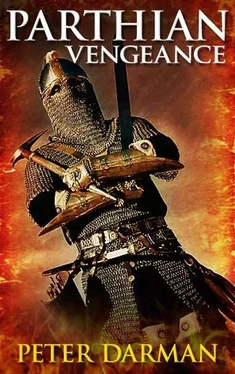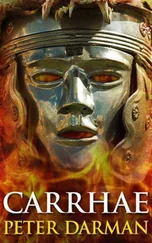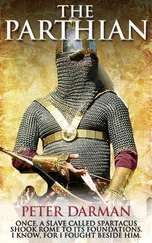Peter Darman - Parthian Vengeance
Здесь есть возможность читать онлайн «Peter Darman - Parthian Vengeance» весь текст электронной книги совершенно бесплатно (целиком полную версию без сокращений). В некоторых случаях можно слушать аудио, скачать через торрент в формате fb2 и присутствует краткое содержание. Год выпуска: 2012, Жанр: Исторические приключения, на английском языке. Описание произведения, (предисловие) а так же отзывы посетителей доступны на портале библиотеки ЛибКат.
- Название:Parthian Vengeance
- Автор:
- Жанр:
- Год:2012
- ISBN:нет данных
- Рейтинг книги:5 / 5. Голосов: 1
-
Избранное:Добавить в избранное
- Отзывы:
-
Ваша оценка:
- 100
- 1
- 2
- 3
- 4
- 5
Parthian Vengeance: краткое содержание, описание и аннотация
Предлагаем к чтению аннотацию, описание, краткое содержание или предисловие (зависит от того, что написал сам автор книги «Parthian Vengeance»). Если вы не нашли необходимую информацию о книге — напишите в комментариях, мы постараемся отыскать её.
Parthian Vengeance — читать онлайн бесплатно полную книгу (весь текст) целиком
Ниже представлен текст книги, разбитый по страницам. Система сохранения места последней прочитанной страницы, позволяет с удобством читать онлайн бесплатно книгу «Parthian Vengeance», без необходимости каждый раз заново искать на чём Вы остановились. Поставьте закладку, и сможете в любой момент перейти на страницу, на которой закончили чтение.
Интервал:
Закладка:
Moments later his ebullient cavalry commander marched into the room and saluted.
Everything about Mark Antony was big: his thick neck, his round face and his solid frame. And the same could be said of his personality, which made him enormously popular among both the soldiery and Antioch’s nobility, especially their wives.
Gabinius pointed at an empty couch. ‘Can I offer you something to eat, Mark Antony?’
Mark Antony reclined on the couch and gestured at the slaves to bring him food.
‘You are very kind, governor. Our new guests are eager to meet you.’
Gabinius groaned. As proconsul of Syria he had better things to do than waste his time playing host to a group of Parthian exiles who had suddenly descended on him. Mark Antony noted his lack of enthusiasm.
‘You do not wish to see them, governor?’ he asked, nibbling on a grape.
Gabinius handed his plate to a slave. He had suddenly lost any appetite he may have had.
‘Not particularly. No doubt they wish to borrow money from me to maintain their lavish lifestyle, either that or drag me into their internecine Parthian squabbles. I have little interest in either. What is the situation in Judea?’
‘The rebels have been confined to an area in the southeast of the kingdom, around Alexandreum and Jericho. Soon we will have destroyed all of them.’
Gabinius nodded approvingly. He had spent a considerable amount of money on Mark Antony, who had at first refused an offer to serve under him in Syria. The young man had been in Athens at the time studying rhetoric and philosophy, as well as seeking refuge from his many creditors in Rome, but the incentive of a commission as the commander of all the Roman cavalry in Syria had changed his mind. The fact that none existed in Syria at the time had required Gabinius to pay for the raising of a full ala of cavalry — a thousand horsemen — to satisfy Mark Antony’s vanity, but the governor considered the expenditure an investment. For one thing his young commander was a member of the Antonia clan, one of Rome’s most influential families, whose support would be useful when Gabinius returned to the city, which unfortunately would now be sooner rather than later.
Some of Mark Antony’s horsemen rode behind the governor and his cavalry commander as they later made their way from the villa to the city of Antioch, the ‘Athens of the East’.
‘It is perhaps fortuitous, governor, that these Parthians have appeared at this time.’
‘Fortuitous is not a word I would use,’ muttered Gabinius.
‘You may be interested to know that I captured a number of Jewish rebels some days ago and had them all tortured before they were crucified.’
‘My congratulations,’ remarked Gabinius sarcastically.
‘But what they revealed before they died,’ continued Mark Antony, ‘was most interesting.’
‘And what was that?’
‘The weapons that armed the Jewish insurgents came from Parthia.’
Gabinius halted his horse. ‘Are you certain of this?’
‘Quite certain, governor. It came from the mouths of more than one of the condemned. I think they were so forthcoming with information in the hope that it would save their lives.’
‘And did it?’ asked Gabinius.
Mark Antony shook his head. ‘No. There can be no mercy for the enemies of Rome.’
Gabinius urged his horse forward. ‘Quite right. Well, perhaps our Parthian guests can shed more light on this matter.’
The pace of their journey was slowed as they rode through Antioch’s wide streets crowded with caravans, travellers, worshippers and citizens. Founded nearly two hundred and fifty years ago by Seleucus Nicator, one of Alexander of Macedon’s generals, it was still populated mainly by Greeks, though it also contained a host of other races, a teeming mass of tens of thousands of people. Built beside the River Orontes, Antioch grew rich from the trade between the Mediterranean and Mesopotamia and the produce of the surrounding fertile valleys. Its many theatres, temples, libraries and public baths were testimony to the city’s great wealth. And the promise of riches attracted people from far and wide, its great squares always thronged with poets, philosophers and out-of-work actors entertaining the public with varying degrees of success. Gabinius had done little to stamp Roman influence on the city apart from ordering the building of an aqueduct to being fresh water from nearby Mount Silpius and paving the city’s gravel roads.
The Parthians had appeared a week ago. The first Gabinius knew of their impending arrival was the appearance of a fat courtier at his headquarters; a man with pale skin, a wispy beard and small piggy eyes whose grovelling servility he had found distasteful. The Parthian nobles had subsequently sent the governor a sizeable amount of gold as thanks for his offer of sanctuary in their time of strife (though in reality they had invited themselves), which had been far more satisfying. Gabinius had given them rooms in Antioch’s palace, a vast edifice built on the island formed by two branches of the Orontes. This complex was also Gabinius’ headquarters but was so expansive that it allowed him to avoid them and ignore their requests for an audience with him, but today he had agreed to meet them, if only to end the constant fawning messages they sent him and his senior officers.
The same fat courtier that Gabinius had met a week ago greeted him and Mark Antony at the doors to the chambers in the west wing of the palace where the Parthians had been housed. The courtier bowed to them and then opened the doors to allow them to enter. Gabinius had his helmet in the crook of his arm and he looked disapprovingly at Mark Antony and then down at his own helmet, indicating that his subordinate should also remove his headgear.
The room was spacious and airy, with red marble columns supporting the ceiling and green marble tiles covering the floor. The tiles came from the local quarry that produced the same coloured marble that furnished local villas and was also exported to Greece and Italy. The courtier took short steps as he led them to the far end of the room towards two high-backed chairs occupied by a man and woman.
The courtier halted around five paces in front of the seated individuals and bowed deeply to them.
‘The Proconsul Aulus Gabinius and Praefectus Alae Mark Antony, highnesses,’ he announced in a high-pitched voice. He turned to the pair of Romans and bowed again.
‘My I present King of Kings Mithridates, high king of the Parthian Empire, and his mother, Queen Aruna.’
Gabinius nodded his head at them both and Mark Antony flashed a smile at the full-bosomed woman wearing a sour expression. The Romans’ seeming lack of deference earned looks of disapproval from the gaudily dressed courtiers assembled either side of the royal pair. One individual caught the governor’s attention: a young man in his early twenties, tall, broad shouldered, clean-shaven and with a fair complexion and shorter hair than the other men. He had a handsome face, or would have had it not been for the hateful expression it wore. He seemed to be positively bristling with animosity.
Regarding the king, the proconsul thought that the wide cheekbones and long, pointed jaw line of this Mithridates made him look like a snake, an image reinforced by his dark brown, almost black eyes and slim frame.
‘I trust your quarters are agreeable.’
‘We do not intend to stay here long,’ the king shot back.
Gabinius was pleased by this good news. The last thing he needed was a landless, ungrateful king and his hangers-on in his province.
‘Though we are grateful for your hospitality,’ smiled the queen, who Gabinius noted was dripping with gold and diamond jewellery. Indeed, he observed that all the courtiers appeared to be wearing gold rings and necklaces, while rich stones dangled from the women’s ears.
Читать дальшеИнтервал:
Закладка:
Похожие книги на «Parthian Vengeance»
Представляем Вашему вниманию похожие книги на «Parthian Vengeance» списком для выбора. Мы отобрали схожую по названию и смыслу литературу в надежде предоставить читателям больше вариантов отыскать новые, интересные, ещё непрочитанные произведения.
Обсуждение, отзывы о книге «Parthian Vengeance» и просто собственные мнения читателей. Оставьте ваши комментарии, напишите, что Вы думаете о произведении, его смысле или главных героях. Укажите что конкретно понравилось, а что нет, и почему Вы так считаете.












